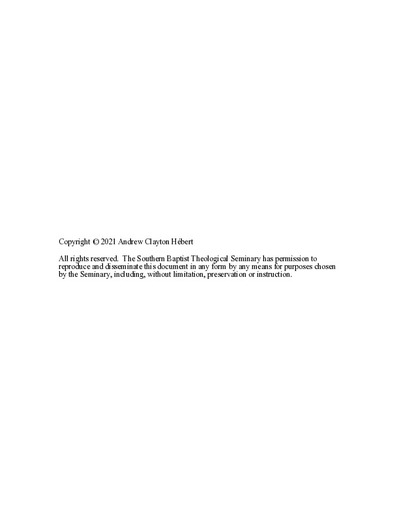Shaping Church Culture: Table Fellowship, Teaching, and the Spirit in Luke-Acts
Subject
Bible. Acts--Criticism, interpretation, etc.Bible. Luke--Criticism, interpretation, etc.
Table--Religious aspects--Christianity
Teaching--Religious aspects--Christianity
Church history--Primitive and early church, ca. 30-600
Description
Ph. D., Southern Baptist Theological Seminary, 2021
Abstract
This dissertation examines Luke-Acts to explore how and to what effect Jesus and early church leaders intentionally shaped the culture of their followers. In Luke, table fellowship was a primary means Jesus used to shape the culture of his followers, as demonstrated through the prominence of eleven meal scenes. In Acts, teaching was a primary means early church leaders used to shape the organizational culture of the early church, as demonstrated through five paraenetic sermons addressed to the church. Additionally, the Spirit influenced the culture of the early church through various means and in various ways. Table fellowship, teaching, and the Spirit shaped the behavior, values, and underlying beliefs of the early church related to Jew/Gentile relations (Acts 10-11; Acts 15), who should be considered as insiders/outsiders (Luke 5:29-39; Luke 7:36-50, Luke 19:1-10), hypocrisy (Luke 11:37-54), Sabbath regulations (Luke 6:1-5), status and humility (Luke 14:1-24; Luke 22:14-34), Jesus' identity (Luke 9:10-17; Luke 24:13-43); the disciples' obedience (Luke 9:10-17; Luke 10:38-42); leadership (Acts 1:15-26; Acts 20:17-38); mission (Acts 2); unity (Acts 2); devotion (Acts 2); generosity (Acts 2); prayerful dependence on the Holy Spirit (Acts 2); and attitudes of inclusion toward people of different generations, genders, and ethnic groups (Acts 2; Acts 10-11).

